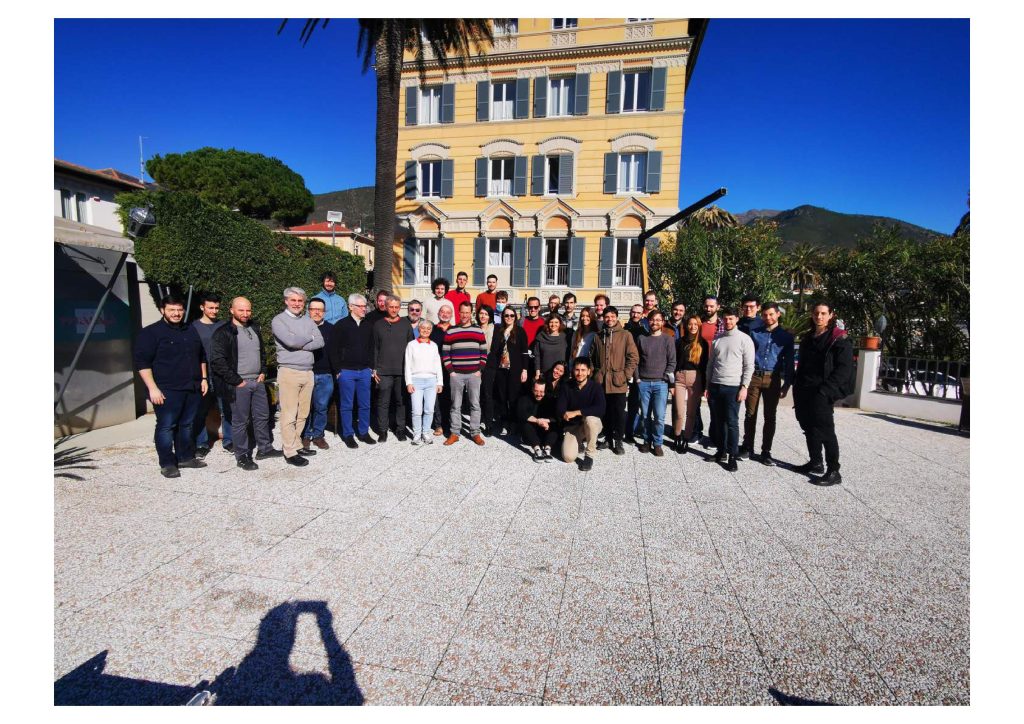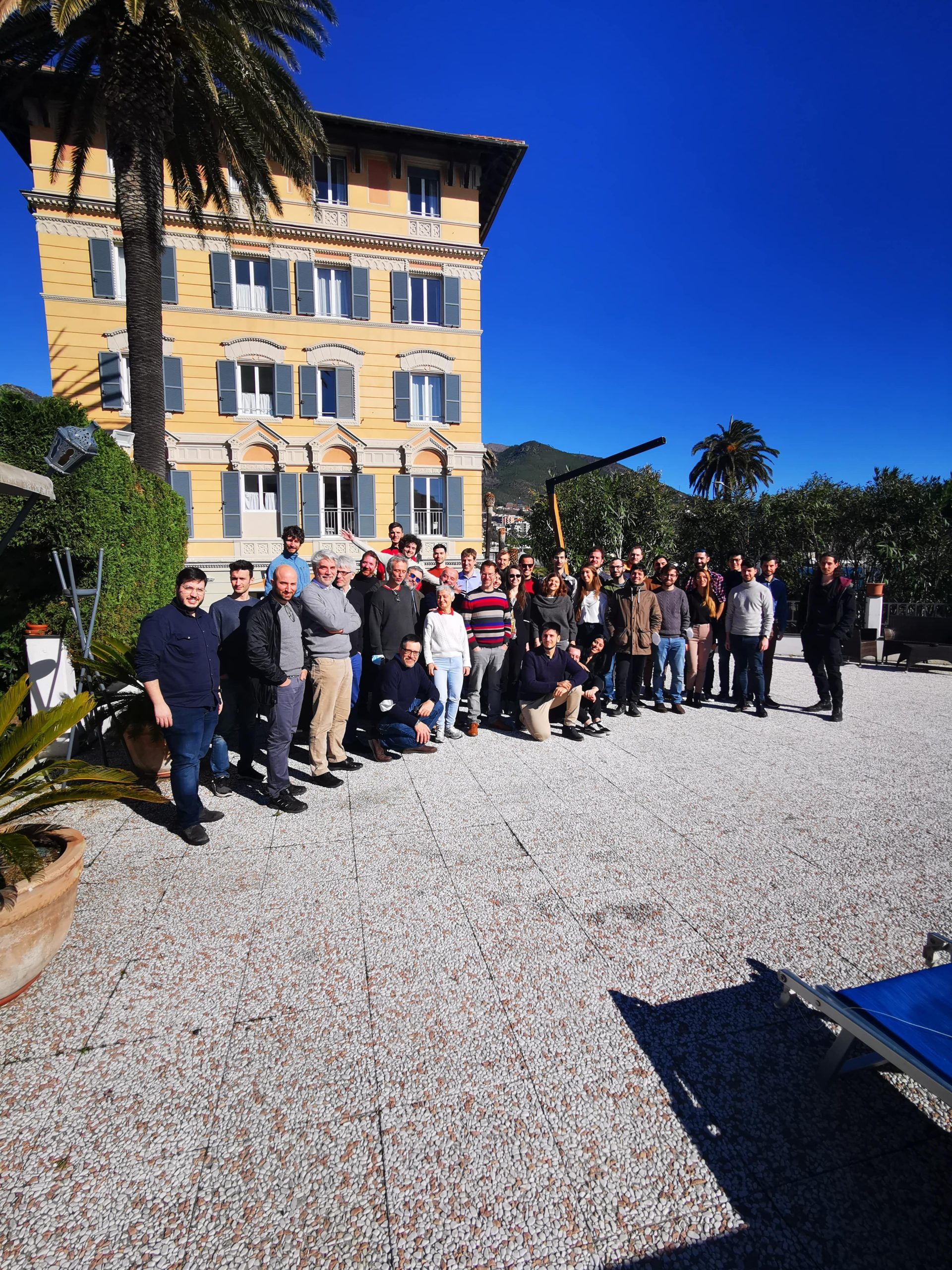
The Eighth Workshop of the Interdepartmental Center SmartData@PoliTO will be held on February 25 and 26, 2022 in Arenzano (Genova) at the wonderful Grand Hotel Arenzano.
We will meet to present and discuss activities carried over in the center, inviting PhD students to discuss their ongoing work and new members to present themselves and their research activity.
Location
The location will be Grand Hotel Arenzano located in Lungomare Stati Uniti, 2 16011 Arenzano (Genova). For information, write to info@gharenzano.it or the call +39 010 91091.
Chairs
Martino Trevisan & Daniela Renga
Pictures from the Workshop



















Agenda
| Thursday, February 24th | 20:00 – 22:00 | Dinner |
| Friday, February 25th | 08:00 – 09:00 | Breakfast |
| 09:00 – 10:30 | Session 1 – Talks | |
| 10:30 – 11:00 | Coffee break | |
| 11:00 – 12:40 | Session 2 – Talks | |
| 12:40 – 14:30 | Lunch break | |
| 14:30 – 16:00 | Session 3 – Discussion | |
| 16:00 – 16:30 | Coffee break | |
| 16:30 – 18:00 | Session 4 – Talks | |
| 20:00 – 22:00 | Dinner | |
| Saturday, February 26th | 08:00 – 09:00 | Breakfast |
| 09:00 – 10:30 | Session 5 – Talks | |
| 10:30 – 11:00 | Coffee break | |
| 11:00 – 12:40 | Session 6 – Talks |
Detailed program
Thursday, February 24th
20:00 – 22:00 Dinner
Friday, February 25th
08:00 – 09:00 Breakfast
09:00 – 10:30 Session 1
09:00 – 09:30:
-
Stefano Grivet-Talocia: Data-driven passive macromodeling: an overview [slides]
Physical and first-principle modeling of electrical, electronic and electromagnetic systems often leads to overly complex descriptions, which are not adequate for fast and efficient model-driven design flows. Data-driven model order reduction (“macromodeling”) has thus become a standard practice for reducing this complexity to acceptable levels. This talk will review the general topic of extracting compact dynamical models from input-output response data, focusing on past achievements, recent activities, and future challenges.
09:30 – 10:30 (20 minute talks):
-
Fabio Mazza: Autoregressive Neural Networks for Epidemics [slides]
-
Francesco Della Santa: Graph Informed Neural Networks and Regression on Graphs [slides]
-
Giuseppe Attanasio: Contrastive Language-Image Pre-training for the Italian Language [slides]
10:30 – 11:00 Coffee break
11:00 – 12:40 Session 2
11:00 – 11:30:
-
Pietro Michiardi: Generative Diffusion Models: Key Ideas, Current Practice and Challenges
In this talk, we will discuss a special class of generative models, called diffusion processes, and present their applications as well as challenges that the scientific community is currently addressing.
We will first provide some background for the generative modelling task, and introduce the basic tools that are required to understand diffusion processes. We will then quickly overview the general topic of energy-based modelling, give some example applications, and focus on score-based generative models. Our goal is to provide an overview of the theory behind score-based models, but also to demystify them and suggest a practical interpretation of these methods.
We will conclude the talk with some challenges we are currently addressing, including going beyond image data, multi-modality, and methodological advances that are required to improve the practical application of such exciting new methods.
11:30 – 12:40 (10 minute talks):
-
Dena Markudova: Reinforcement learning for congestion control of real-time applications [slides]
-
Philippe Bich: A Naturally Pruned Non-conventional Neural Network trained with Softmax Shrinking [slides]
-
Moreno Pintore: New approaches to solve parametrized differential equations using neural networks [slides]
-
Nikhil Jha: Private data generation, strategies and future perspectives [slides]
-
Silvia Buccafusco: Autoencoder-based cluster regression [slides]
-
Lorenzo Vaiani: Leveraging Multimodal Content for Podcast Summarization [slides]
-
Flavio Giobergia: First experimental results on the spatial resolution of RSD pad arrays read out using machine learning techniques [slides]
12:30 – 14:30 Lunchtime
14:30 – 16:00 Session 3 – Discussion
Open discussion about future directions of the center.
16:00 – 16:30 Coffee break
16:30 – 18:00 Session 4
16:30 – 17:00:
-
Giovanni Squillero: Applications of Computational Intelligence
While there is no commonly accepted definition of “Computational Intelligence”, it may be maintained that it differs from Artificial Intelligence by focusing more on tasks that would require intelligence if performed by a human; historically, it includes Neural Networks, Fuzzy Systems, Evolutionary Computation, and Multi-Agent Systems. The talk sketches some recent applications, some more practical, some less, all based on techniques classifiable under this umbrella term. Its explicit goal is surveying a set of open research activities, from the analysis of heterogenous art objects to the detection of COVID based on mass spectra, to foster possible cooperations.
17:00 – 18:00 (20 minute talks):
-
Bartolomeo Vacchetti: Cinematographic Shot Classification through Deep Ensemble Learning [slides]
-
Thomas Favale: Enlightening the Darknets: Augmenting Darknet Visibility with Active Probes [slides]
-
Antonio Mastropietro: From XAI to Game Theory [slides]
20:00 – 22:00 Dinner
Saturday, February 26th
08:00 – 09:00 Breakfast
09:00 – 10:30 Session 5
09:00 – 09:30:
-
Mauro Gasparini: A bird’s-eye view of Statistics
Statistics is a major player in Data Science, and yet it may be viewed as something not exactly modern. This view is partially true, since Statistics is rooted in Probability, which is at least three-century old. On the other hand, a lot of the concepts and techniques used in the analysis of data are statistical in nature and continuously developing. I will use as blueprint the logical sequence of concepts taught in Politecnico in Mathematical Engineering, Data Science and Engineering and in other courses.
09:30 – 09:50 (20 minute talk):
-
Luca Colomba: Rescue – AI for Earth Observation (Part 1) [slides]
09:50 – 10:30 (10 minute talks):
-
Simone Monaco: Rescue – AI for Earth Observation (Part 2) [slides]
-
Elena Sabbioni: Bayesian approach for modelling RNA transcription [slides]
-
Luca Piano: Training in presence of scarcity of real data with synthetic dataset and domain adaptation [slides]
-
Jacopo Fior: Financial Time Series Summarization: Application of time series embedding to the financial domain for the creation of human readable summaries [slides]
10:30 – 11:00 Coffee break
11:00 – 12:40 Session 6
11:00 – 11:30:
-
Gianvito Urgese: Data Analytics in Bioinformatics & Neuromorphic Engineering [slides]
The Human Genome Project can be considered the big bang of the computational biology field. Indeed, from more than 30 years bio-experiments generate big data to be properly processed, with optimized Bioinformatics tools, to gain novel insights into humans and living organisms. At the same time, a new scientific discipline named Neuromorphic Engineering has emerged as an exciting research area, primarily owing to the paradigm shift from conventional computing architectures to low-power and data-driven cognitive computing. In this scenario, the speech will focus on the motivations and challenges for the development of optimized algorithms and tools to process data in both the Bioinformatics and Neuromorphic Engineering fields.
11:30 – 12:10 (20 minute talks):
-
Eliana Pastor: Looking for Trouble: Understanding subgroup behavior via pattern divergence [slides]
- Moreno La Quatra: Inferring Multilingual Domain-Specific Word Embeddings From Large Document Corpora [slides]
12:10 – 12:40 (10 minute talks):
-
DBDMG: Building Robust Speech Recognition System for the Italian Language [slides]
-
Salvatore Greco: Explaining Deep Natural Language Processing by Mining Textual Interpretable Features [slides]
-
Luca Gioacchini: DarkVec: Automatic Analysis of Darknet Traffic with Word Embeddings [slides]
